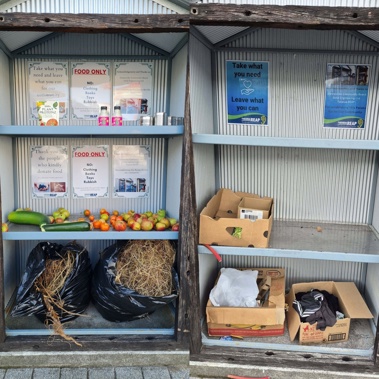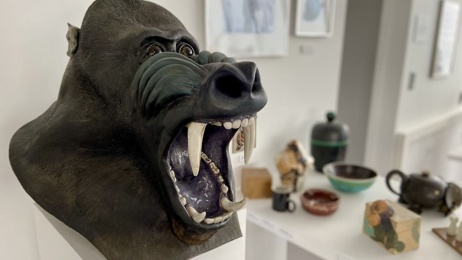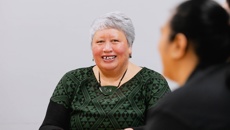
A Dannevirke community food pantry is increasingly being misused by people dumping garbage instead of food.
Over the last year, household rubbish, old medication, food waste, and even “random bags of hay” have raised logistical and sanitary concerns for the Pātaka Kai team.
Recently, there was a discovery of two dead rats that office manager Lynley Densham said had been placed in the pantry.
“That was the worst day.”
 Office manager Lynley Densham putting more cans on the Pātaka shelves.
Office manager Lynley Densham putting more cans on the Pātaka shelves.
Weekly, staff have to start the day by cleaning up rubbish left in the unit at 15 Gordon St.
“Every Monday morning seems to be a pattern. But most days our staff have to clean something out,” Tararua REAP marketing manager Alice Franklin says.
The Pātaka Kai, managed by Tararua REAP, was set up in June 2020 after the first Covid lockdown to address community need for food security and greater access to fresh fruit and vegetables.
Local gardeners, schools, retailers, and individuals contribute food donations, which are quickly taken by those who need them.
 From food to trash: Items such as food waste and bags filled with hay, left at the Pātaka Kai.
From food to trash: Items such as food waste and bags filled with hay, left at the Pātaka Kai.
However, with the ongoing rubbish issue, the team is exploring solutions to address the problem.
“There are CCTV cameras up, so we are now monitoring to see if there is a repeat offender,” Franklin says.
Tararua District Mayor Tracey Collis said council supports organisations such as Tararua REAP in their efforts to prevent people from misusing community resources.
“We are always sending out messages asking people to look after the environment because it costs everybody,” she said.
Collis said this is a common issue for many charity institutions.
Clothing bins had been closed after being misused.
“That’s not something we want to see happen to the Pātaka Kai because they are just so needed in the community.”
Despite the challenges, Franklin highlights how giving the community is.
“The amount of food that gets donated shows what a generous community we have in Dannevirke,” she said.
“We sometimes hold things back when there are large donations and put them out at different times and days to make sure we reach more people.”
For her, the Pātaka success depends on collective responsibility.
“We wanted to ask the community to help us eliminate the rubbish problem by taking more ownership of the asset.”
Take your Radio, Podcasts and Music with you









